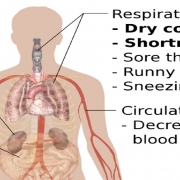Coronavirus and Pneumonia
(Compiled by Dr. Md. Mozammel Hoq)
- COVID-19 Pneumonia Symptoms
- How Many People With COVID-19 Will Get Pneumonia?
- Who’s Most Likely to Get It?
- How Is COVID-19 Pneumonia Diagnosed?
- Are There Treatments for COVID-19 Pneumonia?
- COVID-19 Pneumonia Prevention
Most people who get COVID-19 have mild or moderate symptoms like coughing, a fever, and shortness of breath. But some who catch the new coronavirus get severe pneumonia in both lungs. COVID-19 pneumonia is a serious illness that can be deadly.
What Is Pneumonia?
Pneumonia is a lung infection that causes inflammation in the tiny air sacs inside your lungs. They may fill up with so much fluid and pus that it’s hard to breathe. You may have severe shortness of breath, a cough, a fever, chest pain, chills, or fatigue.
Your doctor might recommend cough medicine and pain relievers that reduce fever. In the most serious cases, you may need to go to the hospital for help breathing with a machine called a ventilator.
You can get pneumonia as a complication of viral infections such as COVID-19 or the flu, or even a common cold. But bacteria, fungi, and other microorganisms can also cause it.
What is novel coronavirus-infected pneumonia?
The illness tied to the new coronavirus was originally called novel coronavirus-infected pneumonia (NCIP). The World Health Organization renamed it COVID-19, which is short for coronavirus disease in 2019.
COVID-19 Pneumonia Symptoms
A fever, a dry cough, and fatigue are common early signs of COVID-19. You may also have nausea, diarrhea, muscle aches, and vomiting.
If your COVID-19 infection starts to cause pneumonia, you may notice things like:
- Rapid heartbeat
- Shortness of breath or breathlessness
- Rapid breathing
- Dizziness
- Heavy sweating
How Many People With COVID-19 Will Get Pneumonia?
About 15% of COVID-19 cases are severe. That means they may need to be treated with oxygen in a hospital. About 5% of people have critical infections and need a ventilator.
People who get pneumonia may also have a condition called acute respiratory distress syndrome (ARDS). It’s a disease that comes on quickly and causes breathing problems.
The new coronavirus causes severe inflammation in your lungs. It damages the cells and tissue that line the air sacs in your lungs. These sacs are where the oxygen you breathe is processed and delivered to your blood. The damage causes tissue to break off and clog your lungs. The walls of the sacs can thicken, making it very hard for you to breathe.
Who’s Most Likely to Get It?
Anyone can get COVID-19 pneumonia, but it’s more likely in people who are 65 or older. Those who are 85 or older are at the highest risk.
People who live in nursing homes or who have other health problems like these also have higher chances of more severe illness with COVID-19:
- Moderate to severe asthma
- Lung disease
- High blood pressure
- Heart disease
- Diabetes
- Liver disease
- Renal failure
- Severe obesity, or a body mass index (BMI) of 40 or higher
Someone who has a weakened immune system may be more likely to get severe COVID-19 illness, too. This includes smokers, people being treated for cancer, people who have had a bone marrow transplant, people who have HIV or AIDS that’s not under control, and anyone who takes medications that slow the immune system, like steroids.
How Is COVID-19 Pneumonia Diagnosed?
Your doctor can diagnose COVID-19 pneumonia based on your symptoms and lab test results.
Blood tests may also show signs of COVID-19 pneumonia. These include low lymphocytes and elevated C-reactive protein (CRP). Your blood may also be low in oxygen. A chest CT scan may show patchy areas of damage in both your lungs. Doctors call this “ground glass.”
Are There Treatments for COVID-19 Pneumonia?
Pneumonia may need treatment in a hospital with oxygen, a ventilator to help you breathe, and intravenous (IV) fluids to prevent dehydration.
Clinical trials are looking into whether some experimental drugs and treatments used for other conditions might treat severe COVID-19 or related pneumonia:
- Antivirals, including remdesivir, which the FDA hasn’t approved but which was developed to treat the Ebola virus
The malaria drugs chloroquine and hydroxychloroquine, sometimes along with azithromycin, an antibiotic
COVID-19 Pneumonia Prevention
If you’re in a high-risk group for COVID-19 pneumonia, take these steps to prevent infection:
- Wash your hands often. Scrub with soap and water for at least 20 seconds.
- If you can’t wash your hands, use a hand sanitizer gel that’s at least 60% alcohol. Rub it all over your hands until they’re dry.
- Try not to touch your face, mouth, or eyes until you’ve washed your hands.
- Avoid anyone who’s sick. Stay home and avoid others as much as you can.
- Regularly clean and disinfect surfaces in your home that you touch often, such as countertops and keyboards.
The pneumonia vaccine protects against a kind of bacteria, not the coronavirus. But it can support your overall health, especially if you’re older or have a weak immune system. Talk to your doctor about whether you should get it.


